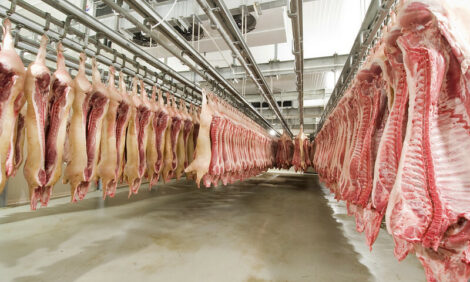COOL remains 'costly, cumbersome' and unrelated to BSE, AMI declares
US - Less than 48 hours after DNA testing confirmed that the BSE cow identified in Washington state was in fact born in Canada, Sen. Tom Daschle (D-S.D.) renewed his attempts to re-position the Country-of-Origin Labeling law with yet another food-safety spin.
|
Need a Product or service?
|
|
With both producer-activists and consumer groups cheering him on, Daschle said that American consumers "need to know all they can about Canadian beef," referring directly to mad cow disease at a news conference Wednesday (Jan. 7).
AMI responded strongly, noting that COOL was never intended to be a food-safety measure.
"It is inappropriate, as well as alarmist, to try to link country-of-origin labeling with any food safety issue -- particularly BSE," said AMI President J. Patrick Boyle. "The true purpose of mandatory Country-of-Origin Labeling is to impede imports. No matter what the current claim, COOL remains cumbersome, costly and with little consumer benefit."
Boyle noted that USDA estimates show that mandatory COOL could cost as much as cost $3.9 billion to implement in the first year alone. "It would be disruptive and costly to ranchers, cattle feeders, meat processors and grocery retailers," he said. "This law, far from providing benefits, would drive food costs up and cattle prices down."
Daschle stressed that selling beef with a "Made in USA" sticker would be "good for consumers," while characterizing its implementation as "slightly inconvenient for big meatpacking corporations."
COOL is "far more than slightly inconvenient,“ Boyle responded. "For the thousands of cattlemen, processors and retail grocers who would bear the burden of this law, the costs represent a staggering burden. That is why the Office of Management and Budget said unequivocally that it was one of the most costly laws reviewed in this administration."
Boyle emphasized that the Country-of-Origin Labeling law has no connection whatsoever to BSE in cattle, noting that implementation of this law would not have assisted in USDA's ongoing BSE investigation.
"The firewalls that protect U.S. cattle from an outbreak of BSE have done their job," he said, "and the recent strengthening of those precautions announced by USDA Secretary Ann Veneman last week will strengthen them even more. The BSE infectious agent is not present in meat, so applying a label to an already safe product does not add to its safety."
In response to Daschle's statement that, "America consumers want to know that the meat they buy was raised and processed in the U.S.," Boyle said that characterizing COOL as a consumer right to know issue is disingenuous.
"The COOL language included in the 2002 Farm Bill excludes all foodservice products and exempts poultry from the requirements imposed on beef, pork and other red meats," he said. "If this is a consumer right-to-know issue, then why were more than half of all the animal protein products produced in this country exempted?"
Boyle added that attempts to cast COOL as either a necessary food-safety net or as a consumer right-to-know issue are little more than partisan politics that detract from important ongoing discussions about BSE prevention and control.
"We remain confident in the efforts underway to respond to the case of BSE in Washington state," Boyle concluded, "and we are fully confident in the safety of U.S. beef and the safety of imported beef products, as well."
Source: American Meat Institute (AMI) - 8th January 2004

















